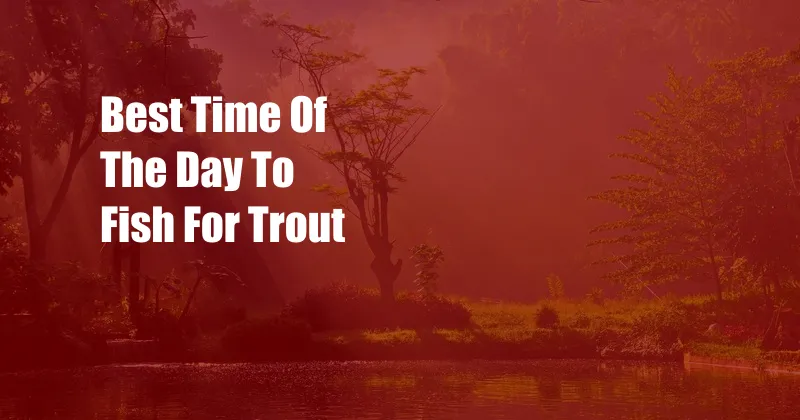
The Optimal Time to Cast Your Line for Trout Abundance
In the tranquil stillness of a sun-kissed lake, my grandfather and I would share secrets whispered only by the gentle lapping of water. Armed with our trusty rods, we’d cast our lines into the crystal depths, hoping to entice the elusive trout that inhabited its hidden realms. One shimmering morning, as the first rays of dawn pierced through the mist, a magnificent trout broke the water’s surface, its silvery scales glinting in the sunlight. That moment ignited a lifelong passion within me, a quest to unravel the secrets of successful trout fishing.
Understanding Trout Behavior
Trout, renowned for their keen senses and elusive nature, are highly influenced by environmental conditions. Their activity levels and feeding habits fluctuate throughout the day, making it crucial to adapt your fishing strategy accordingly.
Whether you’re a seasoned angler or an eager novice, understanding the nuances of trout behavior will significantly enhance your chances of a successful day on the water.
The Peak Hours for Trout Activity
Generally, the most productive time to fish for trout is during the early morning and late evening. As the sun rises, trout emerge from their nocturnal hiding spots, energized by the warmth and increased light. This period, typically known as the “morning bite,” is characterized by active feeding as trout seek sustenance after a long night.
Similarly, as the sun begins its descent and the shadows grow long, trout once again become more active. This “evening bite” provides another excellent opportunity for anglers to target these elusive fish.
Factors Influencing Trout Activity
While the early morning and late evening are generally the best times to fish for trout, several other factors can influence their activity levels. These include:
- Water temperature: Trout prefer cool water temperatures, typically ranging from 55 to 65 degrees Fahrenheit. During the warmest hours of the day, trout may seek cooler depths, making them less accessible to anglers.
- Weather conditions: Trout are less active in extreme weather conditions such as heavy rain or high winds.
- Aquatic insect activity: Trout feed predominantly on aquatic insects, such as mayflies, caddisflies, and stoneflies. When these insects are hatching or swarming, trout activity will increase.
- Fishing pressure: Trout can become wary of heavily fished waters. Choosing less-pressured areas or employing stealthy techniques can improve your chances of success.
Tips and Expert Advice for Enhanced Trout Fishing
- Match your bait to the season: Trout’s preferred bait varies depending on the time of year. During the spring and early summer, when aquatic insects are abundant, live bait or artificial imitations of these insects are highly effective. Later in the season, when insects become less active, try using lures that mimic small fish or crayfish.
- Experiment with different techniques: Trout can be caught using a variety of techniques, including fly fishing, spinning, and baitcasting. Experiment with different methods to determine what works best for the particular conditions you’re facing.
- Be patient and persistent: Trout fishing requires patience and perseverance. Don’t be discouraged if you don’t catch a fish immediately. Keep casting and adjusting your techniques until you find what works.
Frequently Asked Questions about Trout Fishing
Q: What is the best time of year to fish for trout?
A: The best time of year to fish for trout varies depending on the region and species you’re targeting. In general, spring and fall offer the most favorable conditions.
Q: What is the best bait for trout?
A: The best bait for trout depends on the season and the type of trout you’re targeting. Live bait, artificial insects, and small lures are all effective options.
Q: What is the best way to catch trout in a river?
A: When fishing for trout in a river, use lures or flies that mimic the natural food sources available in that environment. Cast upstream and allow your bait to drift naturally.
Conclusion
Unlocking the secrets of successful trout fishing lies in understanding trout behavior, choosing the right bait and techniques, and being patient and persistent. Whether you’re a seasoned angler or a novice eager to explore the world of trout fishing, the knowledge and tips provided in this article will empower you to maximize your chances of success.
Are you ready to embark on the thrilling pursuit of trout fishing? Cast your line today and experience the serenity and excitement of this timeless sport.